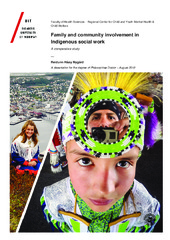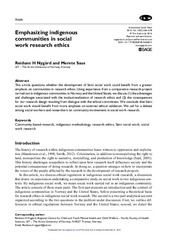| dc.contributor.advisor | Merete, Saus | |
| dc.contributor.author | Nygård, Reidunn Håøy | |
| dc.date.accessioned | 2018-12-11T11:59:47Z | |
| dc.date.available | 2018-12-11T11:59:47Z | |
| dc.date.issued | 2018-12-07 | |
| dc.description.abstract | This thesis investigates the relevance of family and community involvement for culturally adequate social work in Indigenous communities. The study is qualitative and comparative. I compare social work within Indigenous communities in Norway and Montana with the aim of adding to the available knowledge regarding culturally adequate social work in these communities.
The thesis consists of three articles. The first article is a meta-synthesis of existing literature on FGC within cultural contexts. The second article investigate how social work professionals, in Indigenous communities in Norway and Native American communities in Montana, conceptualize culture and ethnicity. The third article investigate ethical regulation of research within social work in Indigenous communities in Norway and in Montana.
In the first part of discussion in the thesis, I ask how the FGC’s core principles – family involvement, restoration, and revitalization – enhance FGC as a culturally adequate model in Sami communities.
The second part of discussion investigate similarities and differences in the reflections of the social workers about how to adjust social work culturally. The social workers argue that closeness and connection with the community facilitates family and community involvement. Based on these findings I propose the theoretical concept of ‘professional closeness’ and argue that deep insight into the local communities and culture is vital for providing culturally adequate social work.
In the third part of discussion, I discuss how Indigenous communities can be respectfully involved in strategies to improve the cultural adequacy of social work. I argue that social workers, and other relevant community members in Indigenous communities, should be involved in the development of social work. At the end of this discussion, I offer specific and practical recommendations for the process of developing models for family and community involvement in social work within Sami communities. | en_US |
| dc.description.doctoraltype | ph.d. | en_US |
| dc.description.popularabstract | Denne studien samanliknar sosialt arbeid i samiske samfunn i Norge og native samfunn i Montana.
Det er gjengs einigheit om at det er nødvendig med kulturelt adekvat sosialt arbeid i urfolkssamfunn. Kva er kulturelt adekvat sosialt arbeid? Korleis involvera sosialarbeidarar i samiske områder i Norge og native samfunn i Montana familie og lokalsamfunn i sitt arbeid? Kan familieråd være ein aktuell metode for sosialt arbeid i samiske områder?
Familieråd er ein metode for involvering av familie. Denne studien viser at dei teoretiske aspekta; familieinvolvering, gjennopretting og revitalisering er relevante for utvikling av familieråd for sosialt arbeid i samiske samfunn.
Sosialarbeidarar i samiske samfunn i Norge og native samfunn i Montana framhevar viktigheita av nærleik til lokalsamfunn for eit kulturelt adekvat sosialt arbeid.
Gjennom å involvere lokalsamfunn i forsking kan teori og praksis forankrast lokalt. Metodar innanfor sosialt arbeid bør utviklast i dialog med lokalsamfunnet. | en_US |
| dc.identifier.uri | https://hdl.handle.net/10037/14319 | |
| dc.language.iso | eng | en_US |
| dc.publisher | UiT The Arctic University of Norway | en_US |
| dc.publisher | UiT Norges arktiske universitet | en_US |
| dc.relation.haspart | <p>Paper I: Nygård, R.H., & Saus, M. Is Family Group Conference a Culturally Adequate Method outside the Origin of New Zealand? A Systematic Review. (Manuscript in review). Full text not available in Munin. <p>
<p>Paper II: Nygård, R.H., Saus, M. & Nicolay, S.S. Conceptualisations of Culture and Ethnicity within Social Work in two Indigenous Communities: Implications for Culturally Adequate Social Work. (Manuscript in press). Published version in <i>Journal of Comparative Social Work</i>, 13(2), (2018), 4-30, available at <a href=https://doi.org/10.31265/jcsw.v13i2.174>https://doi.org/10.31265/jcsw.v13i2.174. </a><p>
<p>Paper III: Nygård, R.H., & Saus, M. (2016). Emphasizing indigenous communities in social work research ethics. <i>International Social Work, 59</i>(5), 666-678. Also available at <a href= https://doi.org/10.1177/0020872816646815>https://doi.org/10.1177/0020872816646815. </a>Manuscript available at <a href=http://hdl.handle.net/10037/10685>http://hdl.handle.net/10037/10685. </a><p> | en_US |
| dc.rights.accessRights | openAccess | en_US |
| dc.rights.holder | Copyright 2018 The Author(s) | |
| dc.rights.uri | https://creativecommons.org/licenses/by-nc-sa/3.0 | en_US |
| dc.rights | Attribution-NonCommercial-ShareAlike 3.0 Unported (CC BY-NC-SA 3.0) | en_US |
| dc.subject | Social Work | en_US |
| dc.subject | Social Siences | en_US |
| dc.subject | Indigenous | en_US |
| dc.subject | Sami | en_US |
| dc.subject | Native American | en_US |
| dc.title | Family and community involvement in Indigenous social work. A comparative study | en_US |
| dc.type | Doctoral thesis | en_US |
| dc.type | Doktorgradsavhandling | en_US |


 English
English norsk
norsk


